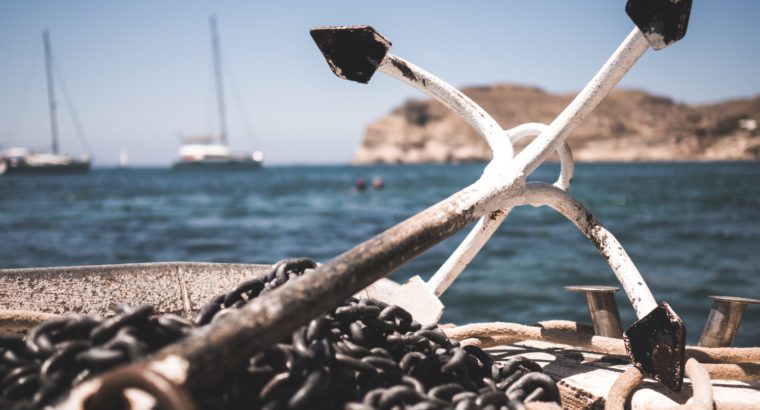How to choose the best anchor for a boat. The Art Of Anchoring.
Choosing the right boat anchor according to your requirements – the art of anchoring –
Choosing the right anchor is one of the most important decisions you will make when sailing. Whether you’re spending a calm day on the lake or encountering bad weather, an anchor is essential to keeping your boat safe and stable. Finding the best anchor for your unique needs can be difficult with so many options on the market. This step-by-step guide walks you through the important variables to consider when choosing a boat anchor that will not only meet but exceed your expectations.
Selection of anchor type:
Before beginning the selection process, it is important to know about the many types of boat anchors available. Each form of anchor has its advantages and adaptability for different sailing situations. Here are some popular types:
How to choose the best anchor for a boat
- Fluke (Danforth or Fortress) Anchors: Fluke (Danforth or Fortress) anchors are a popular choice for small to medium sized boats because they work well on sandy or muddy bottoms. They feature strong handles with sharp points that pierce the seabed.
- Plow anchors (CQR or Delta): Plow anchors (CQR or Delta) are known for their quick setting and strong holding power in a variety of seabed situations. They are suitable for larger vessels and ideal for anchoring on rocky, clay or grassy bottoms.
- Grapple anchors: Grapple anchors are useful for small boats and temporary mooring situations because they are lightweight and collapsible. They work well in rocky or coral reefs. however, in places they may struggle on muddy or sandy soils.
- Sponge Anchors: Sponge Anchors Sponge anchors are common for canoes, kayaks, and small boats. They offer reliable holding power in calm situations and work best on soft surfaces such as mud or mud.
Several factors should be considered when setting a boat’s anchor
Choosing the right boat anchor goes beyond choosing a specific type; Several factors should influence your decision. Let’s explore these critical considerations:

Collected: Different news and blog
1. Size and weight of the boat
The size and weight of your boat play a significant role in determining the appropriate anchor size and strength you will need. Larger vessels require anchors with higher holding capacity to withstand strong currents or winds. As a general rule, aim for an anchor that provides a load capacity of at least three times the weight of your boat.
2. Bottom conditions
Understanding the seabed conditions where you will be anchoring is paramount. Different anchors work better on specific days. For example, random anchors excel in sand and mud, while plow anchors are better suited for grass, dirt, or rock. Consider the typical bottom conditions you will encounter and select an anchor that fits those conditions for optimal performance.
3. Ship environment
The boating environment in which you will move plays a key role in the choice of anchor. If you boat primarily in sheltered areas with calm waters, a lighter anchor may be sufficient. On the other hand, if you frequently venture into open waters or face rough conditions, a heavier and more robust anchor is recommended for better stability and safety.
4. Anchoring material
Anchors are usually made of materials such as galvanized steel, stainless steel or aluminum. Galvanized steel anchors are durable and offer excellent rust resistance, making them a popular choice for many boaters. Stainless steel anchors provide excellent corrosion resistance, making them ideal for saltwater environments. Aluminum anchors are lightweight and suitable for smaller boats, but may not offer the same longevity as their steel counterparts.
5. Features of anchoring
Consider design features that improve anchor performance. These may include sharp, pivoting grooves for better penetration, adjustable blade angles for better grip in different conditions, or pivoting mechanisms to prevent the anchor from tangling. These features can greatly contribute to the efficiency and ease of use of your anchor.
At first glance, prefer the anchor on the boat
Choosing the right boat anchor is a critical decision that directly affects the safety and security of your vessel. By understanding the different types of anchors and considering factors such as boat size, bottom conditions, boating environment, anchor material and structural features, you can make an informed decision that will ensure peace of mind during your boating adventures.
Collected: Different news and blog
New and used boats for sale in europe – free boat advertising.
Visit our other websites:
www.boatsforsale.eu
www.boat24.com.au
www.boat24.co.nz
www.lode24.eu
